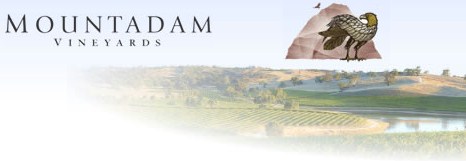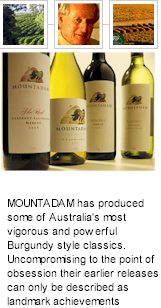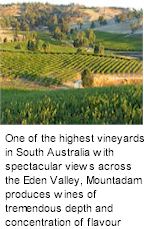


Mountadam is in the Eden Valley which neighbours the Barossa Valley. It takes approximately 1 hour and 15 minutes to reach the Mountadam Winery from Adelaide or 20 minutes from the larger towns of the Barossa Valley such as Angaston or Tanunda. The property was identified after David's exhaustive search of potential sites throughout South Eastern Australia.

David's extensive experience in viticulture and wine production, honed during his days at the Wynn family's estate at Connawarra, had given him a keen eye for the perfect site, and he finally settled on the land that is now Mountadam.
The site selection was based on three critical factors, firstly the stability of climate. Grape growing, like growing any fresh produce, is subject to the weather. Either too little or too much rain at the wrong time can cause ripening and disease problems. Mountadam experiences little or no rain during the critical ripening period.
The cool climate was a critical factor. David Wynn knew that to produce elegant yet powerful wines, the vines should not be subject to the stress of hot conditions. At 550 metres above sea level, it is sufficiently cool to preserve the delicate flavours of the grape through-out its entire ripening process.

Well drained soils also played a major role in the selection of the winegrowing property. Shallow soils over base rock provide perfect drainage and soil dryness to minimise vigour and maximise fruit concentration. Preparations for planting Mountadam commenced in 1970 with many years spent developing and improving the property.
Mountadam wines are always made from the best portion of fruit available from the winery's source vineyards in the Eden and Barossa Valleys. The estate provides a myriad of interesting meso climates and geological formations. Importantly, the various sites which cling the the hillsides and high valleys have been chosen for their true continental climate with warm sunny days and cool evenings. The complex microclimates combined with the classic soils and geologies, provides the Mountadam winemakers with an array of palates from which to craft the superb wines. Mountadam wines are always crafted in honour of the winery's patriarch, David Wynn, the founder of Mountadam and one of the great visionaries of the Australian wine industry
"One of the leading small wineries, founded by David Wynn and run by winemaker son Adam Wynn, initially offering only the Mountadam range at relatively high prices. The subsequent development of the three ranges of wines has been very successful, judged both by the winemaking and wine-marketing viewpoint. Mountadam has built up an extensive export network over many years, This will doubtless be strengthened following the acquisition of Mountadam!" -Winepros.com.au
























